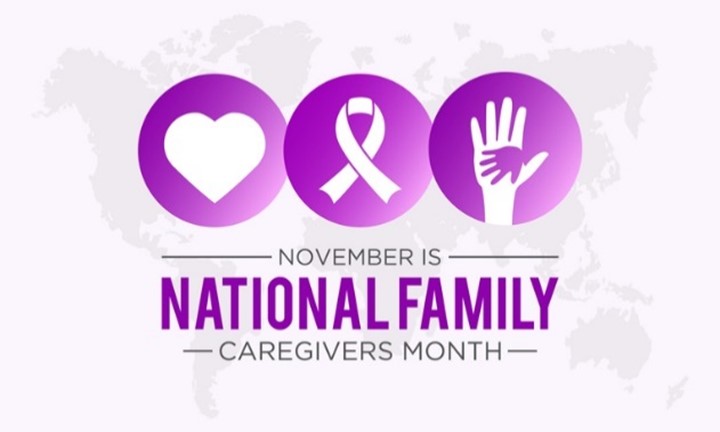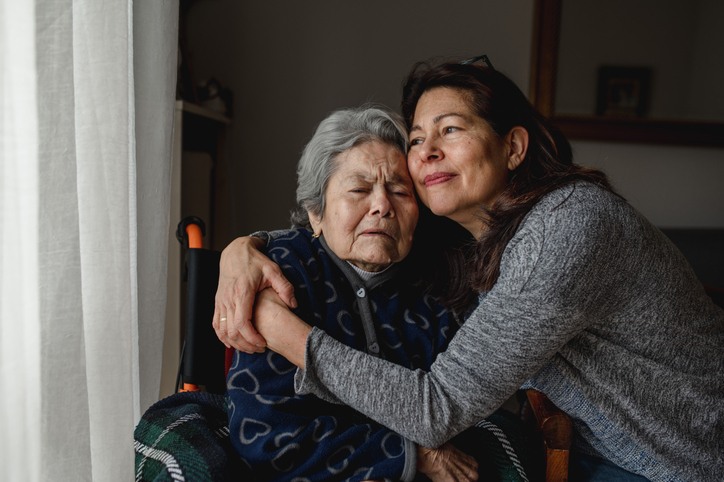November Is National Family Caregivers Month

Day in and day out, more than 4 million family caregivers in the U.S. provide care for adult family and friends with chronic illnesses or other needs for assistance. National Family Caregivers Month offers an opportunity to raise awareness of the issues; celebrate their efforts and increase support for family caregivers.
Caregivers, including caregivers for family members or friends with mental illnesses, tend to be selfless and expect a lot of themselves without recognizing their own need for self-care. They may benefit from the support and encouragement, just as those they care for.
Studies have found that caregivers have higher levels of depression and stress than non-caregivers. Women caregivers are particularly at risk for increased stress, anxiety, exhaustion, depression, reduced immune response and poor physical health. Sometimes caregivers are so focused on helping others that they forget to take care of themselves.
Caregivers Share their Challenges
In May 2024, the Kaiser Family Foundation conducted a series of focus groups with unpaid family caregivers and direct care workers. They found that the family and friend caregivers:

- Often started caregiving because they were the only person available to help.
- Reported that their jobs were physically and mentally demanding and there were limited resources to help deal with challenges of caregiving. They have difficulty balancing caregiving responsibilities with caring for their other family and friends, professional commitments, and themselves.
- Said they struggle to make ends meet, especially when they had to cut back other work to do the caregiving work.
- Said there are few resources available to help deal with mental, emotional, and physical challenges of caregiving and suggested the need for training and resources for caregivers.
Strategies for Caregiver Self-care
Key strategies for caregivers to prevent burnout include asking for help when you need it, seeking emotional support (e.g., virtual and in person caregiver support groups), and taking time out to care for yourself. Taking time to care for yourself ensures you are best able to help your loved one.
- Learn and use stress-reduction techniques.
- Attend to your own healthcare needs.
- Get sufficient rest and nutrition and physical activity.
- Take time off (without feeling guilty) for pleasant, social, nurturing activities.
- Seek and accept the support of others. • Seek supportive counseling if you need it.
Self-Identification as a Caregiver Matters
This month the Caregiver Action Network is emphasizing the reasons it is important to self-identify as a caregiver in various settings to ensure that both the caregiver and care recipient get appropriate support. For example, by sharing your role with your employer you may be eligible for flexible work hours or time off under the Family and Medical Leave Act (FMLA), helping you manage all the responsibilities; by sharing your role with healthcare and insurance providers you can provide valuable insights and advocate more effectively; and by sharing with your friends or with faith leaders you can help strengthen your support network.
Resources for Caregivers
- Caregiver Action Network
The Caregiver Action Network offers a Peer Forum, a Story Sharing platform, the Family Caregiver Toolbox, and more. The Network has a new online resource for BIPOC caregivers that includes a range of resources, including 20 comprehensive lessons, specifically designed to address the unique cultural contexts faced by BIPOC families. - Family Caregiver Alliance
the Family Caregiver Alliance (www.caregiver.org) provides information, support, and resources related to family caregiving with the aim of improving the quality of the life for family caregivers and the people who receive their care. (Resources available in Spanish, Chinese, Vietnamese, and Tagalog.) - Eldercare Locator
The Eldercare Locator is a service of the U.S. Administration on Aging that connects users to state and local resources. - NAMI Family-to-Family Program
The National Alliance on Mental Illness offers a special program for family members of people with serious mental illness called Family-to-Family. The NAMI Family-to-Family Education Program is a free, 8-session educational program for family and friends of people with mental health conditions. It is an evidence-based program taught by NAMI-trained family members. Locate a class.
References
Reference KFF.org. Oct. 2024. Experiences of Direct Care Workers and Family Caregivers of Home- and Community-Based Services (HCBS). P. Chidambaram, A. Mudumala, A. Burns, and R. Rudowitz authors.
